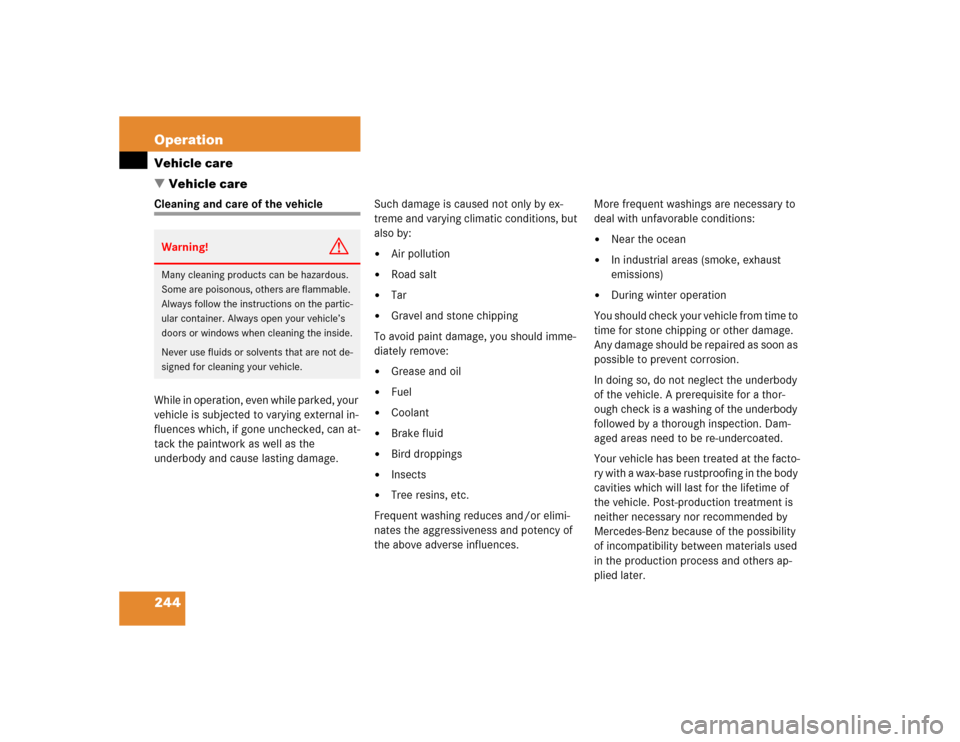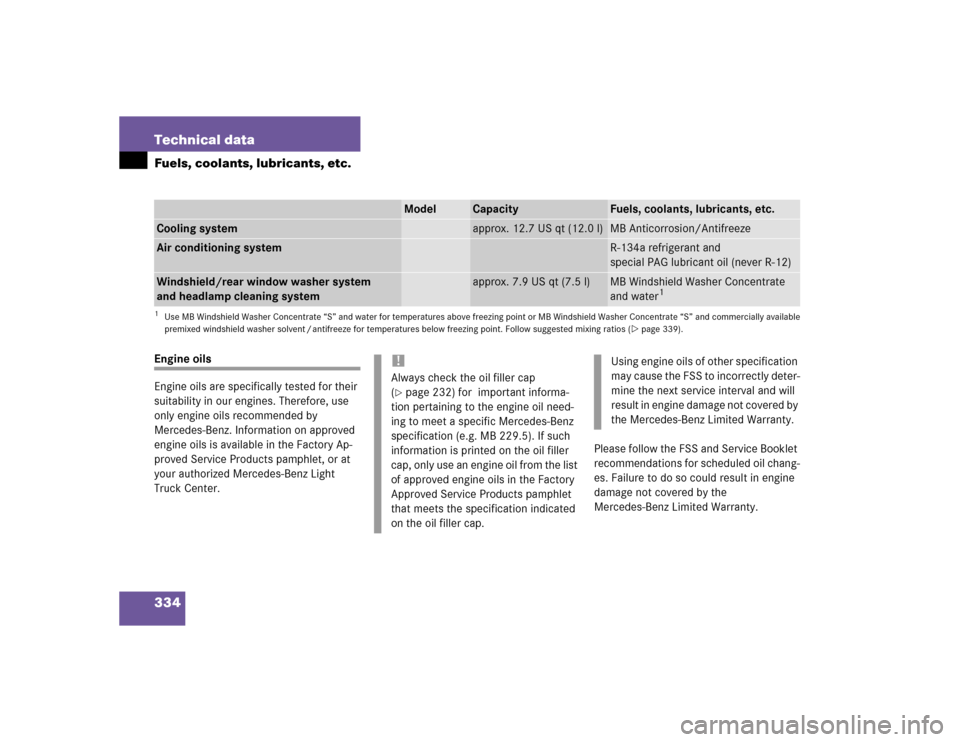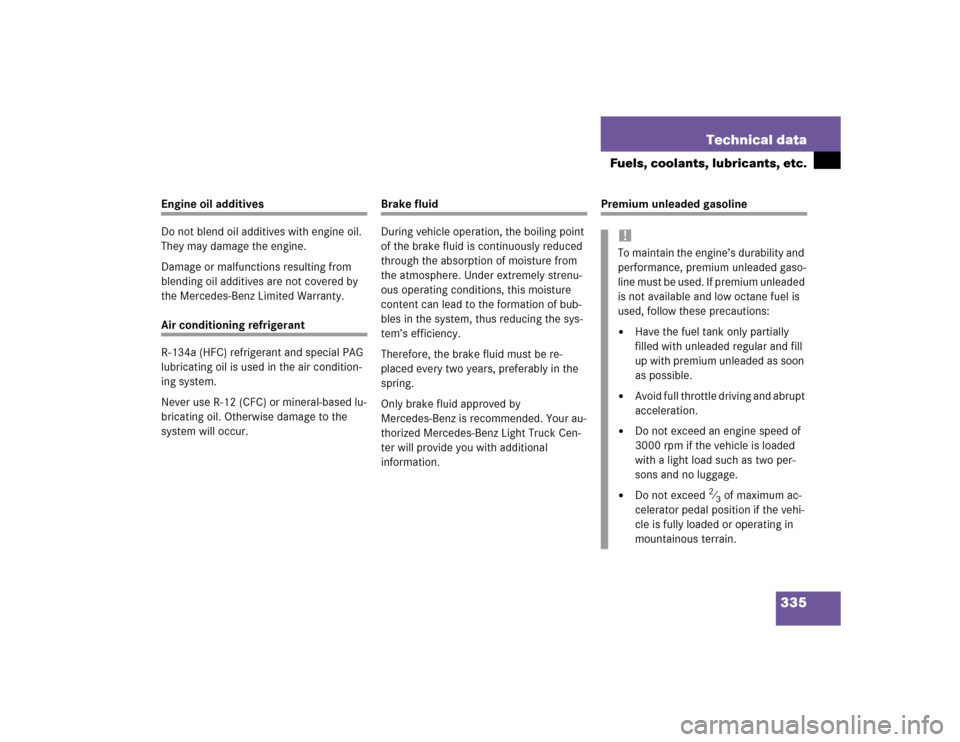Page 244 of 376

244 OperationVehicle care
�Vehicle careCleaning and care of the vehicle
While in operation, even while parked, your
vehicle is subjected to varying external in-
fluences which, if gone unchecked, can at-
tack the paintwork as well as the
underbody and cause lasting damage.Such damage is caused not only by ex-
treme and varying climatic conditions, but
also by:
�
Air pollution
�
Road salt
�
Tar
�
Gravel and stone chipping
To avoid paint damage, you should imme-
diately remove:
�
Grease and oil
�
Fuel
�
Coolant
�
Brake fluid
�
Bird droppings
�
Insects
�
Tree resins, etc.
Frequent washing reduces and/or elimi-
nates the aggressiveness and potency of
the above adverse influences.More frequent washings are necessary to
deal with unfavorable conditions:
�
Near the ocean
�
In industrial areas (smoke, exhaust
emissions)
�
During winter operation
You should check your vehicle from time to
time for stone chipping or other damage.
A n y d a m a g e s h o u l d b e r e p a i r e d a s s o o n a s
possible to prevent corrosion.
In doing so, do not neglect the underbody
of the vehicle. A prerequisite for a thor-
ough check is a washing of the underbody
followed by a thorough inspection. Dam-
aged areas need to be re-undercoated.
Your vehicle has been treated at the facto-
ry with a wax-base rustproofing in the body
cavities which will last for the lifetime of
the vehicle. Post-production treatment is
neither necessary nor recommended by
Mercedes-Benz because of the possibility
of incompatibility between materials used
in the production process and others ap-
plied later.
Warning!
G
Many cleaning products can be hazardous.
Some are poisonous, others are flammable.
Always follow the instructions on the partic-
ular container. Always open your vehicle’s
doors or windows when cleaning the inside.
Never use fluids or solvents that are not de-
signed for cleaning your vehicle.
Page 334 of 376

334 Technical dataFuels, coolants, lubricants, etc.Engine oils
Engine oils are specifically tested for their
suitability in our engines. Therefore, use
only engine oils recommended by
Mercedes-Benz. Information on approved
engine oils is available in the Factory Ap-
proved Service Products pamphlet, or at
your authorized Mercedes-Benz Light
Truck Center.Please follow the FSS and Service Booklet
recommendations for scheduled oil chang-
es. Failure to do so could result in engine
damage not covered by the
Mercedes-Benz Limited Warranty.
Model
Capacity
Fuels, coolants, lubricants, etc.
Cooling system
approx. 12.7 US qt (12.0 l)
MB Anticorrosion/Antifreeze
Air conditioning system
R-134a refrigerant and
special PAG lubricant oil (never R-12)
Windshield/rear window washer system
and headlamp cleaning system
approx. 7.9 US qt (7.5 l)
MB Windshield Washer Concentrate
and water
1
1Use MB Windshield Washer Concentrate “S” and water for temperatures above freezing point or MB Windshield Washer Concentrate “S” and commercially available
premixed windshield washer solvent / antifreeze for temperatures below freezing point. Follow suggested mixing ratios (�page 339).
!Always check the oil filler cap
(�page 232) for important informa-
tion pertaining to the engine oil need-
ing to meet a specific Mercedes-Benz
specification (e.g. MB 229.5). If such
information is printed on the oil filler
cap, only use an engine oil from the list
of approved engine oils in the Factory
Approved Service Products pamphlet
that meets the specification indicated
on the oil filler cap.
Using engine oils of other specification
may cause the FSS to incorrectly deter-
mine the next service interval and will
result in engine damage not covered by
the Mercedes-Benz Limited Warranty.
Page 335 of 376

335 Technical data
Fuels, coolants, lubricants, etc.
Engine oil additives
Do not blend oil additives with engine oil.
They may damage the engine.
Damage or malfunctions resulting from
blending oil additives are not covered by
the Mercedes-Benz Limited Warranty.Air conditioning refrigerant
R-134a (HFC) refrigerant and special PAG
lubricating oil is used in the air condition-
ing system.
Never use R-12 (CFC) or mineral-based lu-
bricating oil. Otherwise damage to the
system will occur.
Brake fluid
During vehicle operation, the boiling point
of the brake fluid is continuously reduced
through the absorption of moisture from
the atmosphere. Under extremely strenu-
ous operating conditions, this moisture
content can lead to the formation of bub-
bles in the system, thus reducing the sys-
tem’s efficiency.
Therefore, the brake fluid must be re-
placed every two years, preferably in the
spring.
Only brake fluid approved by
Mercedes-Benz is recommended. Your au-
thorized Mercedes-Benz Light Truck Cen-
ter will provide you with additional
information.
Premium unleaded gasoline
!To maintain the engine’s durability and
performance, premium unleaded gaso-
line must be used. If premium unleaded
is not available and low octane fuel is
used, follow these precautions:�
Have the fuel tank only partially
filled with unleaded regular and fill
up with premium unleaded as soon
as possible.
�
Avoid full throttle driving and abrupt
acceleration.
�
Do not exceed an engine speed of
3000 rpm if the vehicle is loaded
with a light load such as two per-
sons and no luggage.
�
Do not exceed
2⁄3 of maximum ac-
celerator pedal position if the vehi-
cle is fully loaded or operating in
mountainous terrain.
Page 337 of 376

337 Technical data
Fuels, coolants, lubricants, etc.
The coolant solution must be used year
round to provide the necessary corrosion
protection and increase in the boil-over
protection. Refer to Service Booklet for re-
placement interval.
To provide important corrosion protection,
the solution must be at least 45% anticor-
rosion/antifreeze (equivalent to freeze
protection to approx. - 22°F [-30°C]).
If you use a solution that is more than 55%
anticorrosion/antifreeze (freeze protec-
tion to approx. - 49°F [-45°C]), the engine
temperature will increase due to the lower
heat transfer capability of the solution.
Therefore, do not use more than this
amount of anticorrosion/antifreeze.If the coolant level is low, water and MB
anticorrosion /antifreeze should be used
to bring it up to the proper level (have cool-
ing system checked for signs of leakage).
Please make sure the mixture is in accor-
dance with label instructions.
The water in the cooling system must meet
minimum requirements, which are usually
satisfied by normal drinking water. If you
are not sure about the water quality, con-
sult your authorized Mercedes-Benz Light
Truck Center.
Anticorrosion/antifreeze
Your vehicle contains a number of alumi-
num parts. The use of aluminum compo-
nents in motor vehicle engines
necessitates that anticorrosion/antifreeze
coolant used in such engines be specifical-
ly formulated to protect the aluminum
parts. (Failure to use such anticorro-
sion/antifreeze coolant will result in a sig-
nificantly shortened service life.)
Therefore, the following product is strongly
recommended for use in your vehicle:
Mercedes-Benz anticorrosion/antifreeze
agent.